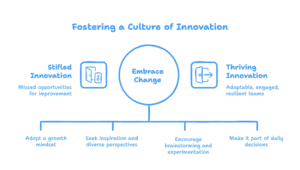In many companies, innovation is treated like a side project or the job of a special department. This approach quietly signals that fresh thinking is someone else’s responsibility. When only a few people are expected to come up with new ideas, everyone else keeps their heads down and sticks to routine. Over time, this dynamic can drain energy and limit the very progress that companies need to stay competitive. Real innovation happens when it becomes part of daily work, woven into the mindset of every person on the team. Often, the best insights come from employees closest to the process, the ones who see problems and possibilities firsthand. Leaders who want more creativity need to build a culture where suggesting improvements feels normal, not risky, and where every voice has a place at the table.
One of the first steps is staying open to change. Teams that get too attached to the way things have always been done can miss valuable opportunities to improve. Trying out new tools, exploring different workflows, or simply asking for feedback can help people see change as progress rather than disruption. A positive mindset also matters. When leaders show genuine interest in new ideas, employees feel encouraged to share them without fear of dismissal. Recognizing even small improvements keeps the energy for innovation alive and sends a clear message that every contribution counts.
Learning from others fuels fresh thinking and helps break routine patterns. Teams can find inspiration by reading about inventors, watching talks about breakthrough products, or connecting with peers in other industries. Exposure to different perspectives gives people the confidence to imagine new approaches in their own work. Creating space for ideas to grow is just as important as encouraging them in the first place. Regular brainstorming sessions, short innovation projects, and informal discussions all give employees permission to test solutions and tackle challenges together. When people see their suggestions taken seriously and put into practice, they gain confidence to keep contributing and look for the next opportunity to make things better.
Innovation should not be limited to annual retreats or executive planning sessions. It belongs in everyday decisions and conversations, where it can take root and spread naturally. Teams that feel trusted to question old habits and propose improvements become more adaptable, more engaged, and more prepared to handle change. A culture where ideas can flourish makes a company stronger and more resilient in the face of new challenges. The next great solution often comes from the people already doing the work if they have the freedom and encouragement to share it.
Here’s the point: When everyone feels responsible for improving the work, innovation becomes a habit instead of a special event.




